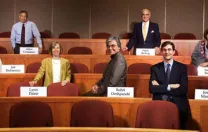Harvard Business School (HBS) maintains the confidentiality of students’ classroom comments, but several members of the M.B.A. class of 2007 shared their impressions of “Leadership and Corporate Accountability” (LCA) after the course ended last spring.
Nikki Baker, a Minnesota native who came to HBS after two years in marketing at PepsiCo, put LCA in the context of the school’s “holistic look at the leader.” Given the potential to abuse business skills, she said—to hide data in accounting reports, to use marketing tools to trick consumers—it would be irresponsibile not to put those disciplines into their legal and ethical context. The course cases prompted wide discussion among her peers, as you “explore for yourself how you would feel if you made the decision one way or another.” In choosing where to work, she said, LCA “really reinforced the importance of picking cultures carefully”—of conducting due diligence on a prospective employer. She said the course’s three-lens framework (economics, ethics, and law) would help her identify issues of concern and be prepared to decide how to react.
|
Amir Yoffe, who was born in Israel but raised in the United States from early childhood, has worked in mergers and acquisitions on Wall Street and in a Texas private-equity firm. He characterized LCA as not an ethics course, per se, but rather general-management instruction, particularly “how to manage in tough times.” (Insofar as LCA’s creators hoped students would broadly apply its lenses of economics, ethics, and law to decisionmaking, that is promising.) In discussing ethical dilemmas, he said, it is easy for students to “get caught up in what you perceive the ‘right’ answer to be.” To overcome such social pressure, he said, faculty members had to push hard to get each point of view across, and ultimately did so. He suggested incorporating simulations, with students arguing each side of a difficult decision, and bringing the actual protagonists, including the “bad guys,” into the classroom, in person or on film.
David J. Anderson would go even further in that direction: students, he said, “don’t hear much from community advocates, fired workers, people displaced by eminent domain.” Anderson, who has worked in consulting, said he’d been skeptical about LCA’s focus on “commonsensical matters—don’t lie, cheat, or steal,” but found that the class “grappled with a lot of really contentious issues” effectively, and covered important “new news”: business law, fiduciary obligations, and the terms of employment. In all, he valued the “practice in using your judgment in situations you many not face for another 25 years.”
Georgiana Mirea, a Romanian who trained to teach mathematics, had found herself in a business career after the liberalization of her country. ìI had no ideaî about abuses such as insider information, she saidónor had she ever heard the eminently practical ìDonít do anything you wouldnít want to see on the front page of the next dayís newspaper.î In future situations involving ìgray areas,î not clearly within or beyond the law, she said, ìNow I will feel much more sense of myself.î
Studentsí willingness to probe their fears and concerns made LCA ìreal life to me,î said Marissa Horne, a Texan who has worked in information technology at Morgan Stanley. Although she had planned to return to systems management (and worked for Microsoft in Bangalore this past summer), Horne said she was so taken aback by some peersí identification with Royal Dutch/Shell in the Nigerian oil case and their views in other cases that the class ìreally made me question my career goals.î She is now examining nonprofit and social enterprises.
Students reported that their antennae have become more finely tuned to their surroundings. Francine Chew, a native of Jamaica who expects to combine investment banking with nonprofit work, said she emerged from LCA conscious that “I have to be aware of circumstances, because I can walk through a situation blindly without recognizing that I actually have a choice.”
Others put LCA into a longer-term perspective. For instance, Suzanne Nutter, who arrived at HBS after seven years at Eli Lilly and Company—which, like Johnson & Johnson, has an explicit statement of corporate values and conduct—said she came away with the sense that managers can “create organizations that are agile enough to respond appropriately to crises, and that are open enough to raise questions about issues in ways that are productive.”
Christensen professor of business administration David A. Garvin made the same point in an especially vivid way. He will teach the course in 2007, so last spring he sat in on most of the classes, among the students. He views LCA, he said, as planting “tiny time pills” set to go off later in the students’ careers. He imagines an HBS graduate sitting on a board of directors and being shocked at the “absence of discussion and dissent,” or as a member of an audit committee presented with a “67-item agenda for a two-hour meeting” who has the courage to object to being railroaded by management. “If that happens,” Garvin said, “the course is a stunning success.”






